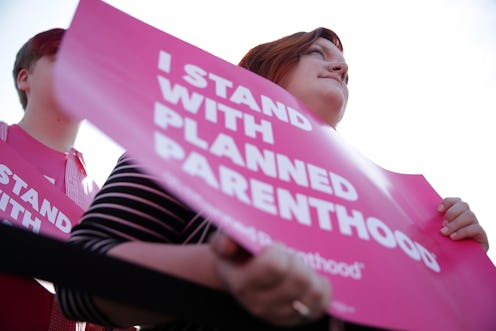
In today's divisive political landscape, leaders on the religious right have been vocal that you can't be both pro choice and religious. Well, that's simply not true. Haling from various denominations, religious leaders are standing in support of Planned Parenthood in a powerful new video. And, you may not know that, historically, many religious leaders have been on the forefront of reproductive rights from the beginning.
"Although mainline and progressive religious leaders played a central role in helping to legalize and increase access to contraception and then abortion services during most of the 20th century, today religious leaders on the right are more visible in public policy debates, and in many states and in Congress they have been increasingly influential in curtailing reproductive rights," Rev. Debra W. Haffner wrote in A Time to Embrace: Why the Sexual and Reproductive Justice Movement Needs Religion.
Because the religious right makes so much noise shaming women's reproductive rights, you might be turned off by religion altogether. However, the new video from Planned Parenthood featuring several clergy members, illustrates that many religious leaders support reproductive rights for what they are — basic human rights.
"People need more access to health care, more access to contraception, more access to education, all the services that Planned Parenthood provides,” Rabbi Lori Koffman of New York City’s Central Synagogue said in the video. “Everything about what Planned Parenthood does really speaks in my mind to Jewish religious ethical values.
Reclaiming The Reproductive Rights Narrative
I was raised Catholic, and attended Catholic school from fourth through twelfth grade, but in high school I officially left the church. The shaming I personally experienced from members of the clergy at my school in regards to my choice to access my reproductive rights made me realize I did not want to be a part of something that did not full support my rights as a woman.
Additionally, Planned Parenthood was my primary healthcare throughout most of my 20s. I literally don't know what I would have done with out them. With Republicans in Congress seeking to remove Planned Parenthood care from Medicaid coverage, almost 400,000 women who rely on the organization for birth control and preventative care will suffer.
Let's be clear about one thing: taking healthcare away from hundreds of thousands of women has nothing to do with religion, and the religious leaders in this video agree.
"As a person of faith I believe that everybody should have access to health care,” Rev. Senior Pastor of the First Iconium Baptist Church in Atlanta, Georgia, Timothy McDonald, III, said in the video. “When people of faith speak up for reproductive justice, compassion becomes the order of the day.”
McDonald also said, "silence is no longer an option," and that ministry is supporting everyone's right to access healthcare. And, historically, religious leaders have supported this basic human right.
"Protestant and Jewish clergy were centrally involved in the early days of the birth control movement," Haffner explained. "In the 1930s, religious denominations passed the first resolutions in support of birth control. In the 1940s, Planned Parenthood formed its first National Clergyman’s Advisory Council. In 1946, more than 3,000 clergy signed a statement against religious opposition to birth control provisions. In the 1950s, clergy successfully protested Roman Catholic hospitals’ decisions to restrict birth control services, and in the 1960s, clergy were a driving force in the movement to secure access to legal abortion."
Her 72-page book calls for "the sexual and reproductive health and justice movement to once again embrace the influence of religion in the United States to further sexual and reproductive justice for all."
By standing with Planned Parenthood, that's exactly what these religious leaders are doing. Because. women's rights are human rights. Period.